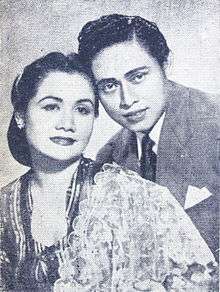Rd Mochtar
Hajji Raden Mochtar (born 1918), often credited as Rd Mochtar, was an Indonesian actor. Of noble descent, Mochtar was discovered by Albert Balink and first cast in the commercial failure Pareh (1936). Rising to popularity after the release of Terang Boelan the following year, he spent nearly sixty years in film, while also becoming a businessman and farmer.
Rd Mochtar | |
|---|---|
_(cropped).jpg) Mochtar in Siti Akbari (1940) | |
| Born | 1918 |
| Occupation | Actor |
| Years active | 1935–1991 |
Notable work | |
Childhood and early career
Mochtar was born in Cianjur, West Java, in 1918.[1] He was a Javanese of priyayi (noble) descent. He did his elementary school studies at a Taman Siswa school in Bandung.[1]

In 1935 Mochtar was cast in the leading role of Mahmud in Albert Balink's film Pareh. Balink was out with coffee with Joshua and Othniel Wong and saw Mochtar, whom he considered tall, strong, and handsome, driving by. Balink and the Wongs chased Mochtar in their car and caught him. For the film Mochtar was told to use the title Raden, which he and his family had already abandoned.[2] According to the Indonesian anthropologist Albertus Budi Susanto, the emphasis on Mochtar's title was meant as a way to draw a higher-class audience.[3] The film, which cost 75,000 gulden to produce, was a commercial failure.[4] However, it was financially beneficial for Mochtar, who was paid a monthly retainer of 250 gulden.[5]
Balink recalled Mochtar for his next film, Terang Boelan (Full Moon), in 1937. Although the role called for Mochtar to sing he was unable to do so. As such, the composer Ismail Marzuki was called to provide Mochtar's singing voice. The film was a commercial success, garnering over 200,000 Singapore dollars during its international release.[6] This led to Mochtar becoming a bankable star and often playing alongside Roekiah. The film also played a role in the establishment of a star system in the country's cinema.[1] Soon after the release of Terang Boelan Mochtar married the actress Soekarsih, whom he had met on the set of Pareh.[7]
After the success of Terang Boelan and Balink's emigration to the United States, most of the cast – including Mochtar – were signed with Tan's Film. Mochtar's first film with the company, Fatima (1938), was a commercial success, earning 200,000 gulden on a 7,000 gulden budget.[8] After making several further films, by 1940 Mochtar had left Tan's over a wage dispute. He made a further three films with Yo Kim Tjan's Populair Films before transferring to Action Film.[9]
Later career
During the Japanese occupation (1942–1945) and ensuing four-year revolution, Mochtar acted in several theatrical groups, including Terang Boelan, Bintang Soerabaja, and Pantai Warna. As the Indonesian film industry gained steam during the 1950s, Mochtar continued acting. Aside from Indonesian films, he also had a role in Rodrigo de Villa, by the Philippine company LVN Pictures.[1]
In the late 1950s the local film industry ebbed and Mochtar became a businessman, then later a farmer. In the mid-1960s he went on the hajj to Mecca, and in the 1970s he began acting again. During this period he received awards from both the West Javan and Jakartan governments for his acting.[1] He continued to be active in film until 1991.[10]
Filmography
Mochtar appeared in 69 films spanning a period of almost sixty years,[10] as follows:
|
|
References
Footnotes
- Encyclopedia of Jakarta, Mochtar, Raden.
- Biran 2009, p. 157.
- Susanto 2003, p. 241.
- Biran 2009, p. 160.
- Biran 2009, p. 161.
- Biran 2009, p. 171.
- Filmindonesia.or.id, Pareh.
- Biran 2009, p. 175.
- Biran 2009, pp. 224, 227.
- Filmindonesia.or.id, Filmografi untuk Rd Mochtar.
Bibliography
- Biran, Misbach Yusa (2009). Sejarah Film 1900–1950: Bikin Film di Jawa [History of Film 1900–1950: Making Films in Java] (in Indonesian). Komunitas Bamboo working with the Jakarta Art Council. ISBN 978-979-3731-58-2.CS1 maint: ref=harv (link)
- "Filmografi untuk Rd Mochtar" [Filmography for Rd Mochtar]. filmindonesia.or.id (in Indonesian). Jakarta: Konfidan Foundation. Archived from the original on 28 July 2012. Retrieved 28 July 2012.
- "Mochtar, Raden". Encyclopedia of Jakarta (in Indonesian). Jakarta City Government. Archived from the original on 28 July 2012. Retrieved 28 July 2012.
- "Pareh". filmindonesia.or.id (in Indonesian). Jakarta: Konfidan Foundation. Archived from the original on 23 July 2012. Retrieved 23 July 2012.
- Susanto, A. Budi (2003). Identitas Dan Postkolonialitas Di Indonesia [Identity and Postcolonialism in Indonesia] (in Indonesian). Yogyakarta: Kanisius. ISBN 978-979-21-0851-4.CS1 maint: ref=harv (link)